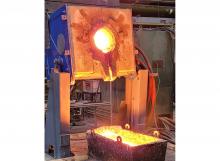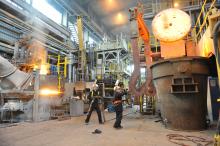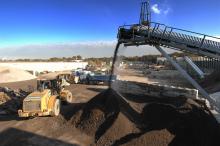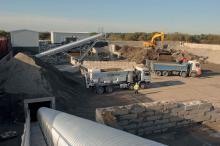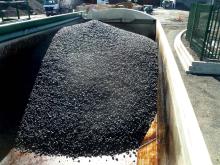
Funding has been secured into research to investigate the potential for the use of slag from steel making being used as a material for road construction.
The Materials Processing Institute has secured a £118,363 research project to investigate methods of converting steelmaking slag into high-grade road surfacing material. For this research, the Materials Processing Institute has been awarded the grant in collaboration with industry and research partners, with which it will work on the project.
The UK Government grant for the research has been awarded through Innovate UK, a body set up to develop technology as part of the Transforming Foundation Industries initiative.
Steelmaking slag is currently crushed and used in the road construction process, but its currently approved 60 PSV level of skid resistance limits use on UK roads accordingly.
The Institute is collaborating with Tarmac, British Steel, Glass Futures and PWS road building services. The 12-month project will seek to increase the silica content of the slag, which is a by-product of basic oxygen steelmaking (BOS). The aim will be to improve its quality and consistency and achieve a higher PSV classification which would allow greater use on UK roads and reduce waste through reuse of the refined slag.
The project will investigate using slags produced in other areas of the steelmaking process, including desulphurisation slag, which is difficult to dispose of. It will also conduct research into the waste streams produced by the glass industry that cannot be recycled.
One objective is to develop several new slags modified by high silica sources, which will be tested by Tarmac for skid resistance. The most promising will be produced in a full-scale plant trial before undergoing further testing.
The second activity of the project is to undertake a detailed assessment of the volumes and values of waste, or difficult-to-reuse, streams of appropriate material from within the glass industry and the steel works to determine the potential for use as a slag modifier.
This research aims to improve the utilisation of by-product and waste streams to increase the value and volume of the by-product stream thereby benefitting both the steel sector and the aggregates sector. It will reduce the current rate of consumption of high quality aggregate, with environmental and balance of payments benefits.
The project will improve the competitiveness of the steel industry by increasing the value and quantity of a by-product by the addition of difficult to recycle materials. It will help the glass industry to deal with 'difficult to recycle' materials. It will improve the competitiveness of the aggregate industry by replacing high cost imported aggregate.
Cross sector collaboration was central to this grant being awarded. The Materials Processing Institute will design, produce and analyse the modified slags at the required scale, British Steel will supply the modifier materials in the appropriate crushed form and Tarmac will carry out the testing and scale up trials. Meanwhile, Glass Futures will assess the volumes and values of waste, or difficult-to-reuse, streams of appropriate material from within the glass industry and PWS Road Building Services will guide the test programme and will facilitate acceptance within the road construction sector.
Chris McDonald, chief executive of the Institute, said: “We are delighted to have been awarded the funds for this innovative project that will seek to repurpose materials that are either already destined for landfill or difficult to reuse.
“The UK steel industry produces around 550,000tonnes of coarse steelmaking slag annually. A commercially viable material will reduce waste, contribute to the circular economy and increase the competitiveness of the steelmaker, glass producer and material processor. “We are confident this investment will pay dividends for the UK economy and further enhance this country’s expertise in research and innovation.”

